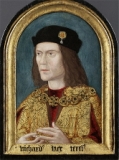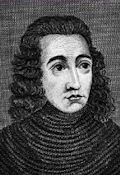14 JULY 1471
 Richard, Duke of Gloucester, receives all the lands in Yorkshire and Cumberland, which had belonged to Richard Neville, Earl of Warwick, from his father’s side.
Richard, Duke of Gloucester, receives all the lands in Yorkshire and Cumberland, which had belonged to Richard Neville, Earl of Warwick, from his father’s side.
Tags: Nevilles, Richard III
 Battle of Edgecote Moor (actually Danes Moor in Northamptonshire), a battle of the Warwick Rebellion.
Battle of Edgecote Moor (actually Danes Moor in Northamptonshire), a battle of the Warwick Rebellion.
In the North, one of the captains of Richard Neville, 16th Earl of Warwick (“The Kingmaker”), calling himself Robin of Redesdale (actually a trusted Neville captain, Sir William Conyers) started a rebellion against Edward IV, which was supported by Warwick and George, Duke of Clarence, brother of Edward IV and Richard III. Edward IV was at Nottingham, where he hoped to meet up with Humphrey Stafford, Earl of Devon, and William Herbert, Earl of Pembroke.
Apparently Devon and Pembroke quarreled on the way, with Pembroke continuing on his own, encountering the rebels near Banbury. Pembroke, his brother Sir Richard Herbert as well as Richard Woodville, Earl Rivers (Elizabeth Woodville’s father), and his son John were taken prisoner and executed on Warwick’s orders without trial.
 Richard, Duke of Gloucester, receives all the lands in Yorkshire and Cumberland, which had belonged to Richard Neville, Earl of Warwick, from his father’s side.
Richard, Duke of Gloucester, receives all the lands in Yorkshire and Cumberland, which had belonged to Richard Neville, Earl of Warwick, from his father’s side.
Tags: Nevilles, Richard III
 Marriage of George, Duke of Clarence (brother of Edward IV and Richard III), to Isabel Neville, elder daughter of Richard Neville, 16th Earl of Warwick (‘The Kingmaker’), and Anne Beauchamp, at Calais. The ceremony took place in secret, as King Edward IV, had explicitly forbidden the marriage. It was conducted by George Neville, Archbishop of York.
Marriage of George, Duke of Clarence (brother of Edward IV and Richard III), to Isabel Neville, elder daughter of Richard Neville, 16th Earl of Warwick (‘The Kingmaker’), and Anne Beauchamp, at Calais. The ceremony took place in secret, as King Edward IV, had explicitly forbidden the marriage. It was conducted by George Neville, Archbishop of York.
 Richard Neville, Earl of Salisbury, his son Richard Neville, Earl of Warwick, and Edward Earl of March (son of the Duke of York, later Edward IV) return from Calais, where they had fled after the Battle of Ludford Bridge (12 October 1459) to invade England in June 1460. On 2 July they are in control of London, except for the Tower.
Richard Neville, Earl of Salisbury, his son Richard Neville, Earl of Warwick, and Edward Earl of March (son of the Duke of York, later Edward IV) return from Calais, where they had fled after the Battle of Ludford Bridge (12 October 1459) to invade England in June 1460. On 2 July they are in control of London, except for the Tower.
The illustration on the left shows Richard Neville, Earl of Warwick, as depicted in the Rous Roll.
 Death of George Neville, Archbishop of York. He was the fourth and youngest surviving son of Richard Neville, fifth earl of Salisbury (1400–1460), and Alice Montagu (c.1406–1462). His eldest brother was Richard, earl of Warwick (“The Kingmaker”). His interest in learning and association with learned men is thought to have been a strong influence on Richard, duke of Gloucester.
Death of George Neville, Archbishop of York. He was the fourth and youngest surviving son of Richard Neville, fifth earl of Salisbury (1400–1460), and Alice Montagu (c.1406–1462). His eldest brother was Richard, earl of Warwick (“The Kingmaker”). His interest in learning and association with learned men is thought to have been a strong influence on Richard, duke of Gloucester.
Tags: Nevilles
The Battle of Wakefield was fought on 30 December 1460 in West Yorkshire. Richard Plantagenet, 3rd Duke of York, and Edmund, Earl of Rutland, father and brother of Edward IV and Richard III, were killed. Also killed was Richard Neville, 5th Earl of Salisbury. Their heads were stuck on poles and displayed over Micklegate Bar, York, the Duke wearing a paper crown.
For a thorough analysis of the battle read Helen Cox, The Battle of Wakefield Revisited: A Fresh Perspective on Richard of York’s Final Battle, December 1460. You can read more on Helen’s website here.
And for visitors we recommend: Helen Cox, Walk Wakefield 1460: A Visitor Guide to Battle-Related Sites
A short description of the various battles of the Wars of the Roses can be found on the website of the Richard III Society (you need to scroll down a bit).
Dorothea Preis
Tags: Battles, Nevilles, Richard Duke of York, Wakefield, Wars of the Roses
 Death of Isabel Neville, wife of George, Duke of Clarence, brother of Edward IV and Richard III
Death of Isabel Neville, wife of George, Duke of Clarence, brother of Edward IV and Richard III
Tags: George of Clarence, Nevilles
 Birth of Richard Neville, 16th Earl of Warwick, who became later known as ‘The Kingmaker’
Birth of Richard Neville, 16th Earl of Warwick, who became later known as ‘The Kingmaker’
Tags: Nevilles
 Edward IV flees to Burgundy, after the rebels under Earl of Warwick, who had by then sided with his former enemy Margaret of Anjou, invaded England with the help of French troops to restore Henry VI. Edward was accompanied by his brother-in-law Anthony, Earl Rivers, and William Lord Hastings. It seems his brother Richard (later Richard III) followed later after trying to gather to support for Edward in England.
Edward IV flees to Burgundy, after the rebels under Earl of Warwick, who had by then sided with his former enemy Margaret of Anjou, invaded England with the help of French troops to restore Henry VI. Edward was accompanied by his brother-in-law Anthony, Earl Rivers, and William Lord Hastings. It seems his brother Richard (later Richard III) followed later after trying to gather to support for Edward in England.
Tags: Edward IV, Nevilles, Richard III
 Enthronement of George Neville (brother of Richard Neville, 16th Earl of Warwick, ‘The Kingmaker’) to the Archbishopric of York. Around that time Richard, Duke of Gloucester (later Richard III), began his time as page with Richard Neville, Earl of Warwick (‘The Kingmaker), at Middleham. It is assumed that he stayed with Richard Neville until January 1469.
Enthronement of George Neville (brother of Richard Neville, 16th Earl of Warwick, ‘The Kingmaker’) to the Archbishopric of York. Around that time Richard, Duke of Gloucester (later Richard III), began his time as page with Richard Neville, Earl of Warwick (‘The Kingmaker), at Middleham. It is assumed that he stayed with Richard Neville until January 1469.
Tags: Nevilles, Richard III